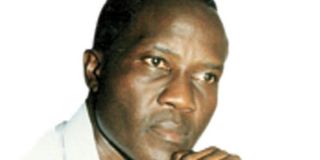Could Prof Kanyeihamba become a Christian terrorist?

Alan Tacca
What you need to know:
In our times, when more of us can debunk almost any supposed miracle, including divine Creation and the Resurrection, spiritual reactionaries like Prof Kanyeihamba more or less demand that our freedom of expression be abolished, so as to protect their beliefs.
Such is my luck. I have caught Prof George Kanyeihamba demonstrating that even the brightest people tend to use the most deformed kind of reasoning when defending the absurdities of their religious faith.
Reading Prof Kanyeihamba’s May 21 comments on my ‘Resurrection is Desirable but Impossible’, which had appeared in the Sunday monitor of April 23 and 30, I remembered Prof Isaac Ojok, one of the Holy Spirit Movement armed rebels led by Alice Lakwena in northern Uganda in the 1980s.
Like his comrades, Prof Ojok believed that an oil smear by a divinely empowered Ms Lakwena made him bullet-proof, and that stones thrown at the enemy would explode like grenades!
Instead of citing an obscure Cardiff University seismologist who believed in (unspecified) miracles, Prof Kanyeihamba should have cited people like Prof Ojok, or Prophet Samuel Kakande, or all those Pentecostal pastors, whose miracles are performed in our midst.
Prof Kanyeihamba wasted his limited space drawing incongruous analogies.
For instance, whether the person you believe to be your biological father is the true father is very different from the question of God.
Why, because the existence of your true father is not in doubt. Even if you do not know him, and even if your mother (also!) does not know him, he must be somewhere, alive or dead.
Moreover, contrary to Prof Kanyeihamba’s assertion, science can now resolve questions of paternity with over 98 per cent certainty; thanks to DNA matching techniques. Few sources of evidence are more respected by our courts, where Kanyeihamba was a distinguished performer.
In contrast, God’s existence cannot be proved with even 2 per cent certainty. It is not about (who) is the true God. It is (whether) He exists at all.
That brings me to the mother of problems.
Prof Kanyeihamba writes that “Religion, beliefs and spiritualism should be no-go areas for politicians and nonbelievers, whether they consider themselves rational, intellectual or geniuses. That subject stands high on Holy ground and fools should not attempt to step upon it lest they perish.”
Prof Kanyeihamba here is thinking like a 14th Century peasant. And, maybe, he is unconsciously ashamed of his beliefs.
For throughout his judicial career, the elements of evidence and systematic reasoning reign supreme; otherwise the delivery of justice becomes virtually impossible.
Then again, Prof Kanyeihamba has at least heard that when scientists and various technical experts are doing their work, evidence and rational thinking are essential.
In our day to day interaction, a measure of rational thinking is essential.
Yet, when it comes to religion, which is apparently so important to Prof Kanyeihamba, the same professor wants all of us to accept any foreign religious beliefs without question; although Europeans were free to trash the beliefs of our forefathers.
Were the great prophets always opposed to being questioned?
Not at all. Moses showed off his snake magic tricks to a pharaoh and his courtiers. Elijah made fire on water, which licensed him to kill hundreds of people of faiths different from his. Jesus displayed the crucifixion wounds to a doubting Thomas.
So, the power of God could be challenged and demonstrated on demand.
There were probably no (real) miracles then, just as today. But thousands of years ago were dark times. Magic tricks and false claims were part of the priest and prophet’s craft in a competitive field. And the people were more gullible.
In our times, when more of us can debunk almost any supposed miracle, including divine Creation and the Resurrection, spiritual reactionaries like Prof Kanyeihamba more or less demand that our freedom of expression be abolished, so as to protect their beliefs.
In other spheres, Kanyeihamba usually reflects an attraction to West European values. But on faith, his reference is the intolerance of those “other (Middle Eastern?) countries where religion is taken for what it is”, and where my fate would be “worse than (Kanyeihamba’s) mild rebuke”.
Well, there were also times in Western Europe when the Church was very powerful and barbaric. It is a short step from Kanyeihamba’s ideas to those old platforms of religious extremism.
In a slightly different environment, could Prof Kanyeihamba become a Christian terrorist?
Mr Tacca is a novelist, socio-political commentator.




